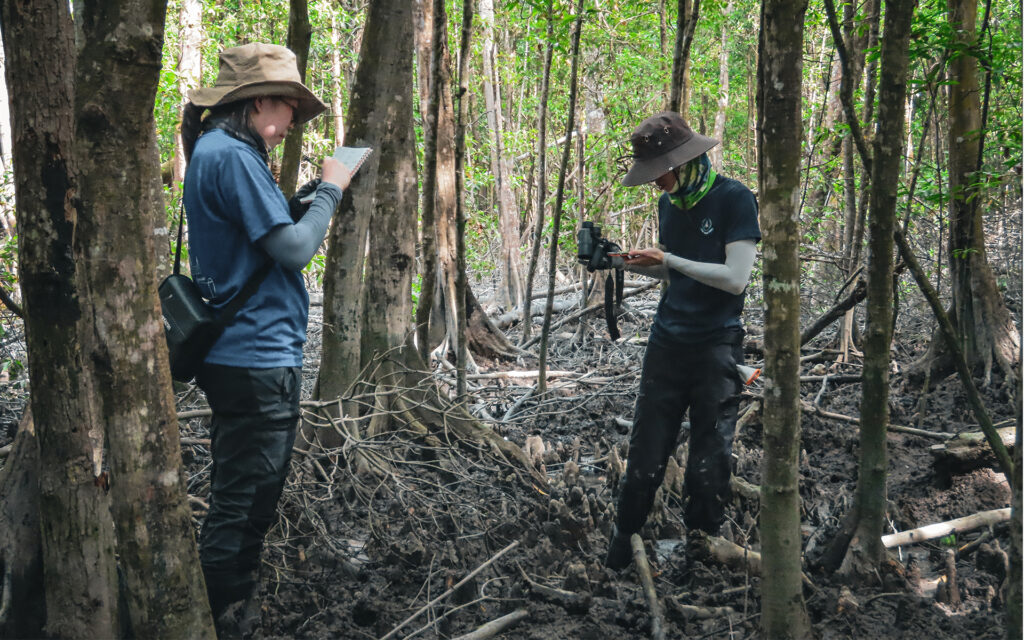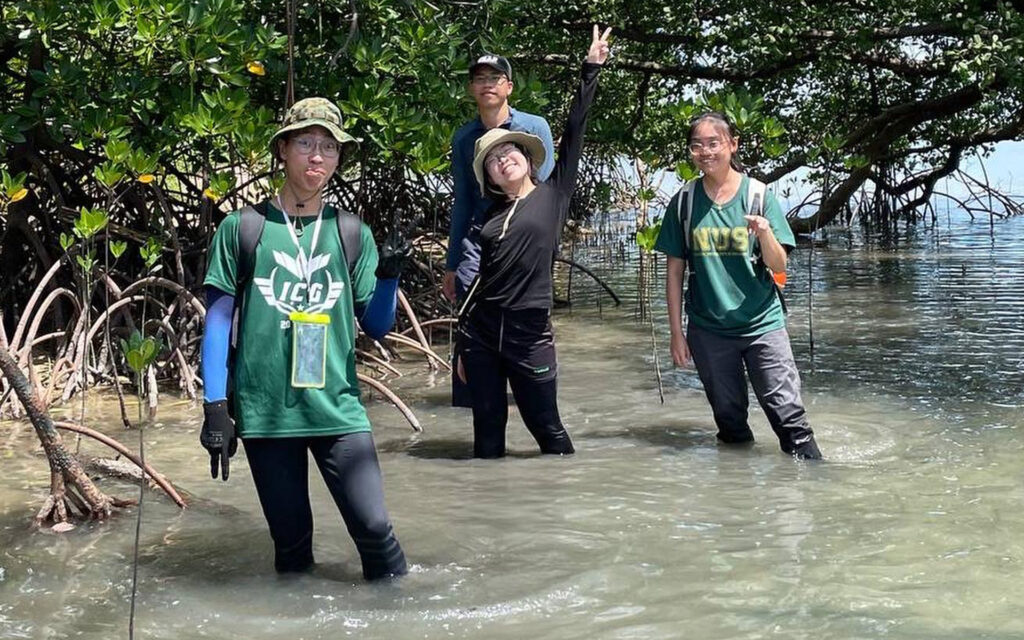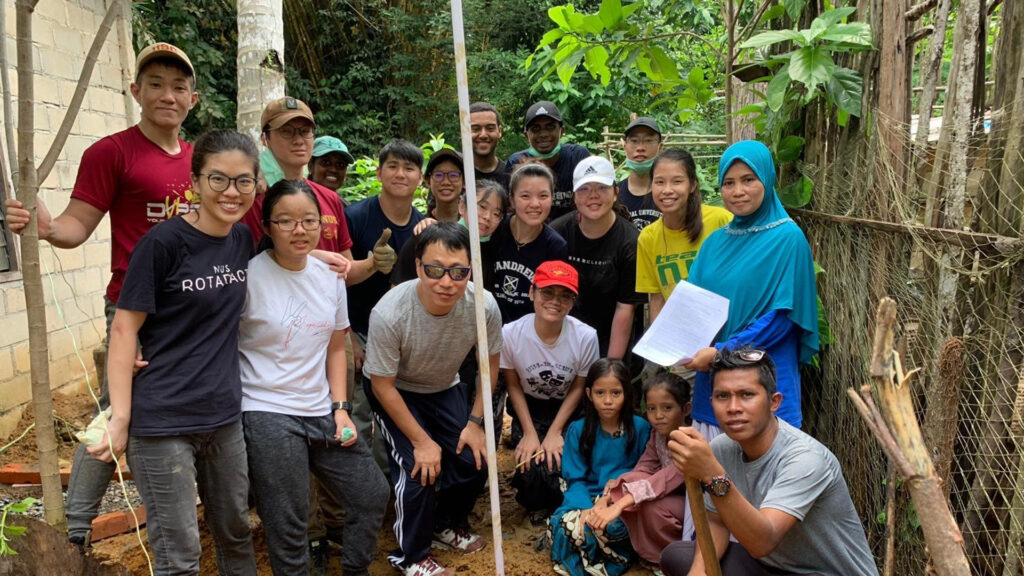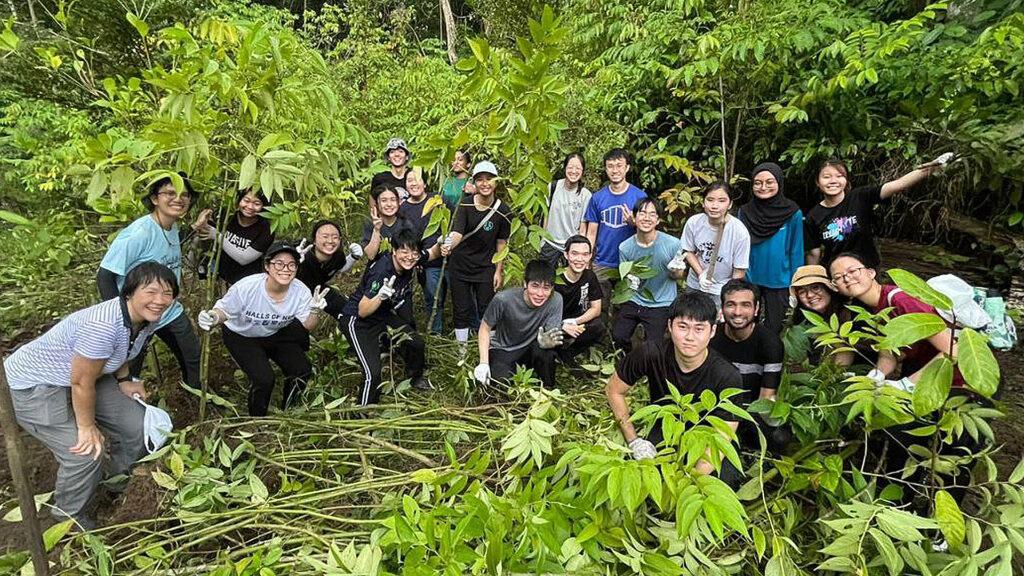Building a Green Future: Sustainability Programmes for NUS Undergraduates
February 13, 2024
IN BRIEF | 8 min read
- In equipping students with the knowledge, skills and competencies, NUS offers a diverse spectrum of more than 650 sustainability-related courses at the undergraduate level, including seven majors, 12 minors and 29 specialisations spanning Engineering, Science, Medicine and the Humanities.
Beyond empowering today’s generation with the skills to tackle urgent environmental threats, sustainability education also aims to nurture nature advocates with the critical problem-solving skills to develop innovative solutions that open doors to greener pathways and emerging economic opportunities.
NUS students will gain a robust understanding of sustainability concepts and develop other transferable skills through the university’s multidisciplinary courses. After graduation, they can look forward to careers in diverse fields such as green financing, design and manufacturing, the energy sector, sustainable tourism, and climate change solutions.
In equipping students with the knowledge, skills and competencies, NUS offers a diverse spectrum of more than 650 sustainability-related courses at the undergraduate level, including seven majors, 12 minors and 29 specialisations spanning Engineering, Science, Medicine and the Humanities.

NUS Vice Provost for Undergraduate Studies and Technology-Enhanced Learning Professor Peter Ho said, “Sustainability is an overarching concern that cuts across, and provides opportunities, for all disciplines. Through our sensing and conversations with industry, it is clear that the industry requires graduates to have multiple competencies, and these include awareness of core considerations in sustainability, environment, as well as compliance and reporting. Thus, NUS undergraduate programmes will continue to build deeper understanding of sustainability issues and cross-functional green skills.”
Here are highlights of some of our sustainability-related Bachelor’s programmes.
Bachelor of Environmental Studies
This four-year direct honours programme was launched in 2011 to groom a new generation of environmental professionals to tackle complex issues such as land conversion, water usage and alternative energy.
The broad-ranging course delves into topics such as Field Investigation in Human Geography, Environmental Modelling, and Coastal Management. It is a joint effort between the Faculty of Science (FOS) and the Faculty of Arts and Social Sciences (FASS), but also features courses from schools such as the Faculty of Law, College of Design and Engineering (CDE), NUS Business School and the Saw Swee Hock School of Public Health.
To take their learning out of the classroom, students can avail themselves for opportunities such as internships, field trips and overseas exchange programmes.

Anna Low Ying Xin, a Year 4 student from the Bachelor of Environmental Studies said her biggest takeaway from the programme was realising the “sheer complexity of what it means to protect the environment”. “The interdisciplinary nature of environmental issues means we must be willing to look from many angles and consider seemingly unrelated information to better understand a situation,” she added.
Bachelor of Engineering (Environmental Engineering)
Air pollution monitoring and control, water quality enhancement and reclamation, resource recovery and circular economy, renewable energy, sustainable development are some of the topics tackled in this four-year direct honours programme under CDE.

Students will gain an understanding of environmental engineering solutions and their impact. They also have the opportunity to take part in design projects and industrial attachments, as well as apply for overseas internships and the overseas Student Exchange Programme.
As the programme is accredited by the Engineering Accreditation Board of Singapore, a signatory of the international Washington Accord, graduates will be able to pursue careers outside of Singapore, such as in Australia, Canada, the United Kingdom and the United States.
MINORS
Students seeking to broaden their perspectives can choose from 12 sustainability-themed minors, even if these are unrelated to their majors. Here are four interesting options offered by the College of Humanities and Sciences.
Minor in Geosciences
Jointly offered by FOS and FASS, the Minor in Geosciences is suitable for science-based students who wish to complement their understanding of the physical sciences with an environmental focus. Engineering students who take up environmental technology courses, and geography majors eager to gain a stronger foundation in science, will also benefit from this minor.
Some of the courses that are offered include Earth and Beyond, Our Planet: An Earth System Science Perspective, Environmental Economics, Natural Resources: Policy and Practice, and Natural Hazards, which are timely topics as environmental management becomes a mounting global concern.
Minor in Aquatic Ecology
Amid a brimming global interest in aquatic sciences, the minor offered by the Department of Geography and Department of Biological Sciences will expose students to the important disciplines of marine and freshwater ecological studies. It is open to all students, except those pursuing a Bachelor of Environmental Studies.
Year 3 undergraduate Yong Xun Liang, who is minoring in Aquatic Ecology noted that the many field trips organised as part of the course help students see a clearer link between the real world and the theory they had learnt. One example was a field trip to S.E.A. Aquarium at Resorts World Sentosa, where students learnt how characteristic megafauna like sharks are used to inspire the public to appreciate and conserve biodiversity, as well as evaluate the welfare and problems that can be associated with aquaria trade.
“(They) helped me gain a complete understanding of the content taught, and highlighted the complex nature of conservation and sustainability,” he added.
Minor in Botany
With courses such as Tropical Horticulture, Fungal Biology, and Vegetation and Plant Diversity of Southeast Asia, the new Minor in Botany – launched in AY2023/2024 – aims to provide students with a systematic understanding of the plant and fungal sciences.
This minor covers more than just plant morphology, ecology, and taxonomy. It also explores social, economic and environmental concerns.

Year 3 undergraduate Nisa Hidayah Binte Helmy, who is minoring in Botany, credits the programme – and the fieldwork, laboratory work, report-writing and presentations that come with it – for teaching her how to tie together the various scientific methods in environmental biology.
“Singapore has been substantially greened amid urbanisation, but there are no botany degrees here,” she said. “This minor would probably be an alternative indicator to employers like the National Parks Board that I have the skillsets they are looking for.”
Minor in Meteorology and Climate Science
One might wonder – what does meteorology have to do with climate science? As the first-of-its-kind in Singapore, the Minor in Meteorology and Climate Science is an introduction to the complex field of weather and climate. This is especially important as the nation currently relies heavily on experts abroad to fill the growing number of vacancies in the field.
Students will study modules such as Numerical Methods for Meteorology, Remote Sensing, and Climate Science and Climate Change Fundamentals. Aspiring meteorologists and climate scientists will need to further their studies at postgraduate level.
This story first appeared in NUSNews on 13 February 2024. Keen to find out more about the university’s wide range of sustainability programmes? View the full list here or email sustainability@nus.edu.sg for more information.

